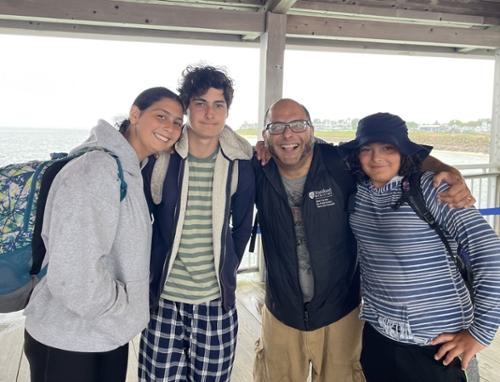Vinicio de Jesus Perez, MD
Associate Professor of Medicine
Division of Pulmonary, Allergy, and Critical Care Medicine
Stanford University

Three statements about you – two true, one false.
- I am an avid comic book collector and pop culture fanatic.
- My favorite summer escape is Martha’s Vineyard in Massachusetts.
- I am a vegetarian.
Give us your ‘elevator pitch’ biography.
I was born and raised in Puerto Rico, where I did my medical school training. After graduating in 2000, I completed an internal medicine training program at the Massachusetts General Hospital in Boston. I subsequently joined Denver's University of Colorado Pulmonary and Critical Care Fellowship from 2003 to 2004. For family reasons, I moved to Stanford in 2004, where I started a postdoctoral research fellowship under the mentorship of Dr. Marlene Rabinovitch, a renowned physician-scientist whose pioneering work established much of the foundation for pulmonary hypertension research. After completing my postdoctoral training in 2011, I joined Stanford as an Assistant Professor of Medicine in the Pulmonary and Critical Care Medicine Division. For the past 12 years, I have established a productive lab dedicated to understanding the mechanisms of pulmonary blood vessel formation and vascular remodeling related to pulmonary hypertension. In recent years, my research interests have broadened to include clinically relevant issues such as methamphetamine-induced pulmonary hypertension, and I have successfully established fruitful collaborations with developmental biologists, geneticists, and clinical trialists.
One of my professional priorities has always been to address health disparities in clinical care, particularly those that afflict underrepresented minorities living in the U.S., such as African Americans, Hispanics, and Native Americans. In the last 10 years, I have spearheaded efforts to address research priorities to address these health inequalities, such as improving access to care, medications, and insurance coverage, and increasing the legal resources available for patients. Beyond the U.S., I have also been involved in global initiatives to address health equity, particularly in Latin America, Africa, and the Middle East. These ongoing initiatives are now part of global initiatives sponsored by international professional societies such as the Pulmonary Vascular Research Institute, the American Heart Association, and the American Thoracic Society, to name a few.
What would you tell yourself as an Early Career Professional?
In the words of Douglas Adams (author of The Hitchhiker's Guide to the Galaxy), "Don't panic!" Most early career faculty worry about what will happen the next day, week, or year. However, academic life is long, and it moves very fast. Just like the essential things in life, we forget to take the time to enjoy our surroundings and the time we spend with the people around us, including faculty, students, and our own family. If I could do something different, I would tell myself to relax, trust that hard work will pay off, embrace the moments spent with the essential people in my life, and to try to be happy.
If you weren’t in medicine, and were in a different industry altogether, what would you be?
I would be a film director and writer for sci-fi and comic books. Since I was little, I have been fascinated with technology, exploration, medicine, and space. My passion for these topics has recently been revitalized by reading the Three-Body Problem trilogy by Cixin Liu, which I highly recommend checking out.
What is your favorite way to spend a day off?
I love to spend time with my family and enjoy rare lazy days. There is something truly magnificent about lying on the couch and spending the day reading and watching a good show.
What areas of medicine are you most excited to see develop?
Precision medicine for rare diseases. Precision medicine will provide us with sophisticated tools to help in early diagnosis and improve clinical outcomes for rare diseases.
What is one advancement in your field you'd like to see in your career?
I see myself as a physician-scientist that is committed to making science work for the patients and ensuring that whatever discoveries are made translate into benefits that improve the quality of care that pulmonary hypertension patients deserve regardless of their social or ethnic, or cultural background or their country of origin. I would love to see therapies capable of reversing vascular disease and improving patients' quality of life with pulmonary hypertension. I would be happy to see patients be removed from lung transplant lists and return to the lives they had before their diagnosis.
Which statement did you make up?
The last one. I am not a vegetarian.